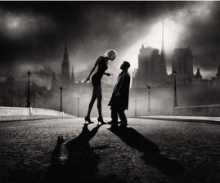Perhaps no French director has embraced American film conventions more than Luc Besson. Most of us Stateside cinema-goers know Besson through his masterpiece The Professional. It is a perfect synthesis of French narrative and American action, a tender story of good people hardened by rough circumstances. Luc Besson has had a hand in several other iconic action movies, most notably his breakout project as the writer/director of La Femme Nikita. That particular film is on the short list of movies later adapted for an American audience that stayed almost completely faithful to the original. Besson also wrote and directed The Fifth Element, a film that seems have inexplicably gotten better with age.
The shame of Luc Besson's filmography is that a majority of it is forgettable action fare. Despite the constant applause about the emotional balance and great casting of movies like Nikita and The Professional, Besson stuck with occasionally overwrought popcorn flicks like Kiss of the Dragon and Wasabi. In fact, he didn't really attempt a movie of any narrative depth since The Messenger: The Story of Joan of Arc. He's put most of his energy into doing character development for the Transporter series and dabbling in TV. That's why his 2005 film Angel-A looked so intriguing. There was no mention of gunplay, no muscle-bound action heroes or car chases. Just a tall, blonde woman claiming to be an angel and the ineffectual man named Andre she promises to help.
But for a few truly beautiful moments, Angel-A is like the inverse to The Professional. Everything that ought to be French about it is American instead, while all the moments that would have been better served by a Hollywood approach end up settling for the Continental version. The plot is fairly simple: Andre is a short, cowardly loser who starts off the movie being harassed by thugs working for one of the many people around Paris to whom he owes money. Faced with insurmountable debt and no good ideas, Andre steps onto the ledge of a bridge and half-heartedly contemplates leaping into the water. The only thing that stops him (maybe) is a blonde woman who calls herself Angela. Together, they agree to solve each others' problems.
With the simple phrase "Je suis a vous", Angela devotes her day to saving Andre from himself, claiming to be his guardian angel. What follows is a series of harsh edits, usually uninspired dialog and unflattering sexual bluntness. Most of the time, all Angel-A has going for it is its sleek camera work. Even that seems a little wasted, though. This is the most egregious of the American-style elements of the movie. Flash without substance.
The movie that could have been is heartbreakingly apparent in a scene that comes about halfway through the film. Andre and Angela duck into a restroom for a pep talk. In front of a mirror, Angela forces Andre to confront the root of his problems, that he ultimately doesn't love or even respect himself, so no one else care much about him, either. Jamel Debbouze, who plays Andre, might just be a strong actor given a more focused director. He manages to sell the potentially lame moment when Andre says into the mirror, "Je t'aime, Andre". This scene is the one good "French" moment in the entire movie.
The ending is where Angel-A really falls apart. Although I don't see how it couldn't. If Angela really is an angel, that distracts from the emotional core of the film's premise, that two desperate people can help one another. On the other hand, if Angela is just a regular woman she ends up being nothing but a contrived narrative device with no real purpose other than to make the protagonist's life better. The fact that the big reveal at the end employs both cheap special effects and a sappy "happily ever after" only makes things worse.
Ultimately, Angel-A is the perfect example of how cultural influence can go wrong. It's easy to identify and trumpet the successful attempts to fuse the narrative conventions of one nation to the style of another, but for those who wish to appreciate and especially those who want to make movies, it's just as important to study the failures.
